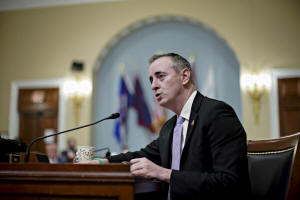Redistricting delays add to Democrats' worries about keeping U.S. House
 Send a link to a friend
Send a link to a friend
 [May 24, 2021]
By James Oliphant [May 24, 2021]
By James Oliphant
WASHINGTON (Reuters) - For the last two
elections, Democrats regarded Brian Fitzpatrick as one of the U.S.
Congress's most vulnerable Republicans, but both times they failed to
unseat him, even when his suburban Philadelphia district voted for
Democratic President Joe Biden.
He is again on their target list for the Nov. 8, 2022, midterm elections
- which will determine whether Biden's Democrats keep control of
Congress - but Democratic officials say finding a suitable candidate
could be a challenge because the borders of the district are in flux and
could be for months.
"That's a significant concern," said John Cordisco, chairman of the
Democratic Party in Bucks County, which lies within the district. "When
you are challenging a multiple-term incumbent, if you don't have
immediate name recognition -- it becomes very problematic."

The reason for the uncertainty is redistricting , the once-a-decade
process by which House of Representatives districts are redrawn based on
shifts in the U.S. population . The process always unsettles
congressional elections, but this year the coronavirus pandemic has
added to the turbulence by delaying the delivery of the census data
needed to draw the districts until September.
"This is the most challenging redistricting cycle in decades," said
Michael Li, a lawyer at New York University's nonpartisan Brennan Center
for Justice.
The redistricting delays compound what is already
shaping up to be a difficult election for Democrats. Typically, the
party that holds the White House loses seats in Congress in the
president's first term. Republicans need a net gain of just five seats
to take control.
[to top of second column]
|

Representative Brian Fitzpatrick (R-PA) speaks during a House
Intelligence Committee hearing on worldwide threats, in Washington,
D.C., U.S., April 15, 2021. Al Drago/Pool via REUTERS

In states such as California, which has its map set by an
independent commission, the redistricting process could run up
against next spring's deadlines for candidates to file.
"For a lot of folks, that can really stall their rollout in terms of
running for office," said Paul Mitchell, a redistricting consultant
in Sacramento. "It's a bigger problem for challengers."
California is home to four of 21 Republican-held districts the
Democratic Congressional Campaign Committee, an arm of the party
that backs House candidates, has targeted for next year.
Fitzpatrick's district is another. The DCCC has also identified 32
other seats held by Democrats that it considers vulnerable.
Fitzpatrick, a former FBI agent, has billed himself as an
independent voice in Congress. His office did not respond to a
request for comment.
Republican control of the vast majority of state legislatures gives
the party an advantage: In states where partisan lawmakers will draw
the new maps, Republicans will fashion 187 new congressional
districts, Li said. Democrats will draw just 75.
[© 2021 Thomson Reuters. All rights
reserved.] Copyright 2021 Reuters. All rights reserved. This material may not be published,
broadcast, rewritten or redistributed.
Thompson Reuters is solely responsible for this content.
 |